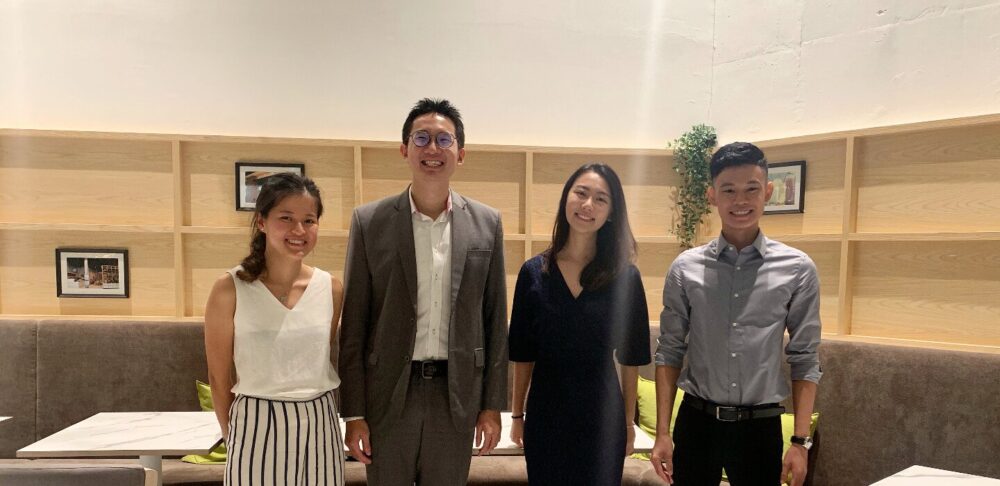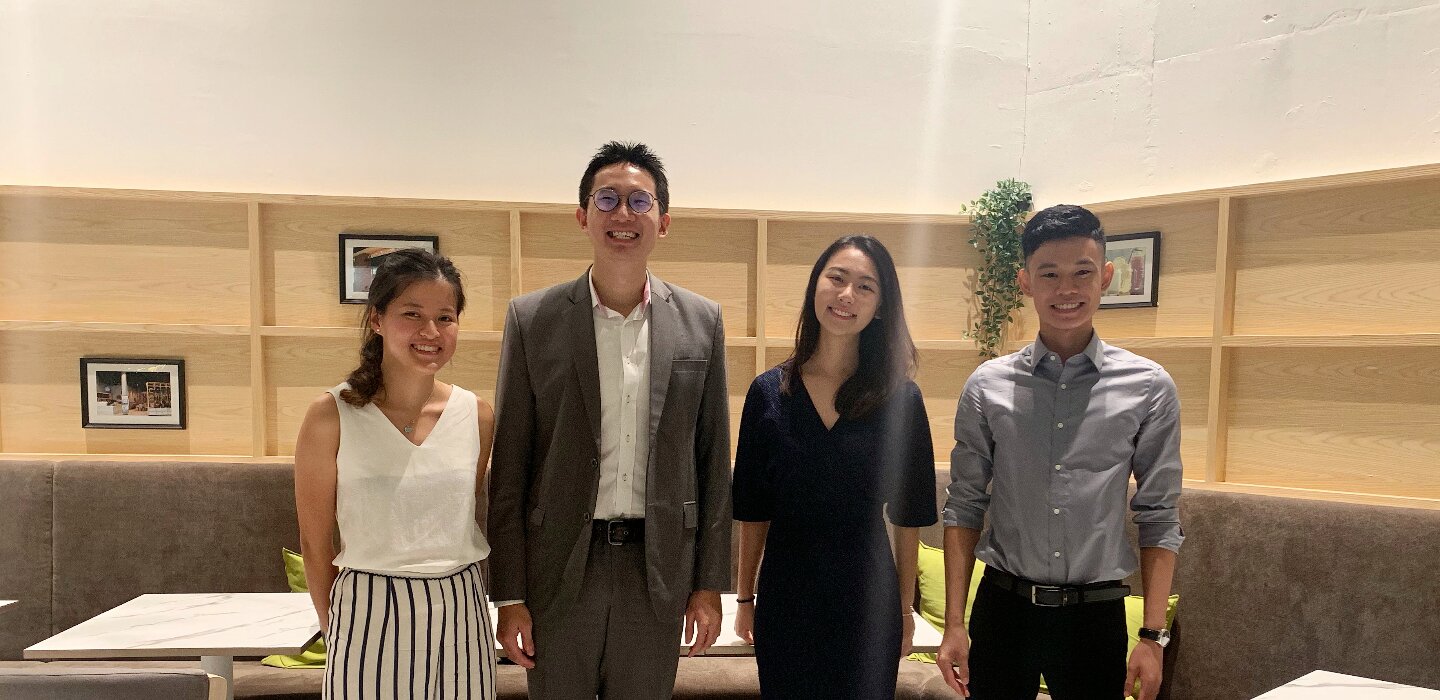Wai Kit is has been in management consulting for more than seven years. Before consulting, Wai Kit was at Monetary Authority of Singapore (MAS) for about two years.
As an undergraduate student, Wai Kit was an international case competition veteran, and received a plethora of undergraduate awards. Moreover, he has been a serial entrepreneur – with ventures in crypto-mining in Bandung, to growing mealworms in Batam, to MBA services and accommodation leases in Singapore.
In his spare time, Wai Kit spends his time on the basketball courts and attempts to make better versions of himself in his three young children.
Q: What were some considerations you had when you chose your first career at the MAS?
I did 2 internships in a bank as an undergraduate student. While I found the pace of investment banking fast and exciting, I was not able to draw on the broader purpose of these roles to life. Yet I still loved finance.
As such, I found the work at MAS meaningful as the role was about building up a better financial ecosystem in Singapore and as I got to deal with finance concepts from school. Incidentally, my role at MAS also gave me a good balance between finance and strategy, which was a natural segway to consulting (which I had not known at that time)
Q: How was a career at the central bank like?
My work at the MAS was refreshing because I had to pitch Singapore as a vibrant financial hub to potential investors and foreign businesses. Accordingly, I had to liaise with various key stakeholders, such as those in the legal and tax spaces, to plan out the flow of high-profile discussions and think of contingency plans if the discussions didn’t pan out as expected.
The first two years was exciting as I saw the very senior conversations unfold right before me – it was a rare privilege for a fresh grad out of school to draw on how political and business veterans spar in the business context. Every question meant something. Every word was planned. The civil service taught me the deliberate nature of writing and speaking which I will bring along for the rest of my career.
Q: Are there any insights about working at a central bank that you feel students should know?
The organisational set-up of the MAS is unique. It is very rare for a central bank to have 3 main operational branches on regulation, investment and business development – to put them simply. Working in this fascinating organisational structure would give one the mobility to move across various operational branches and explore the synergy that exists.
Moreover, working in the public sector is insightful because it illuminates the power of writing, and the gravity of slow and deliberate change.

Lai Wai Kit (second from left), Manager at A.T. Kearney
Bachelor of Business Administration - Finance and Marketing (2010)
Q: What were some reasons you decided to make a career switch from the MAS to A.T. Kearney?
One of my early mentors at MAS told me that “it was okay for the public service to be slower because mistakes are costly, and it is imperative that one is deliberate with decisions before implementation”
As someone eager to see change unfold quickly, I wanted to draw on my problem solving experience at MAS to tap into the private sector. It was a random evening as I met up old school mates from NUS and we talked about consulting – and I said, “why not”
As I interviewed, I slowly realised that my experience as an entrepreneur added much flavour to the conversation. Skill traits such as taking initiative, relentless pursuit of excellence, project management skills are also highly valued in the consulting career.
Q: What are some highlights of your seven years at A.T. Kearney?
Every project is a highlight. In every project, you forge meaningful friendships because you go through tough times together as a team. Besides friendships, you’re exposed to a wide variety of in-depth content in consulting projects.
In my early years, it was exciting to receive a staffing note from the Partners on a Sunday afternoon asking for me to pack my bags and be in Vietnam (or Philippines, or Australia, or…) the next day! Travel was incredibly exciting and discovering a city, its people and culture, its food and ways of working – added to the friendship and content on the project.
Other than highlights from the work front, my Firm is also super supportive of work-life. This creates a sustainable career as I now balance a new normal when my three young kids came into the picture. I am currently on a flex-program where I take a few months out every year to be a full-time dad. This allows me to spend time home and watch my kids grow up in the precious formative years.
In addition, my Firm also sponsored my time at MBA. I enrolled on INSEAD and was surrounded by many bright minds who were achievers in their own ways at the school. There, sabbatical catalysed several ventures that failed spectacularly and some that blossomed into sweet success. The diversity of people and thoughts made me realize how big the world is – yet how similar we all are fundamentally.
Q: What are some skill-sets essential in consulting and how did you cultivate them?
There are 2 broad categories of skill-sets, namely core consulting skills and work attitude.
There are 3 main core consulting skills. The first is analytical and structured thinking, which can be trained by cracking cases. The second is written and verbal communication skills, which I honed during my MAS stint. The third is project management skill, meaning you have to visualize end goals clearly and reverse engineer to identify the deliverables that you have to produce at various checkpoints. My entrepreneurship experience and spirit have helped me develop the third skill.
On work attitude – I reckon these themes will be useful beyond consulting. First, we need to be reliable professionals. Second, a good team player – sometimes a struggle as we transition from school-to-marketplace, competition-to-collaboration. Third, be real and have fun!
Q: What are some things about you that have changed after having worked at A.T. Kearney for seven years?
There is less cushion and leeway for mistakes as you become a manager. It’s like shooting a gun, the more deviation we bring, the further the bullet will land from the target (by a scaled margin).
Think more, upfront.
Q: What are some changes you foresee the consulting industry to go through?
The first key trend is that technology companies are entering the fray and consultancies are seeing the impetus to collaborate with them in response. Next, clients are more sophisticated in that they are keen on long-term programs with many phase-based projects to help drive actual change.
Q: Would you have done anything differently if you could rewind time?
No 🙂 I am happy for who I am, and the past defines me for who I am.
Q: Do you have any advice for our readers?
Don’t chase for the first-class opportunities defined by society. It is perfectly fine for us to do anything in life – we just need to be good at the things we do, chase excellence and derive meaning from our days.
Q: How important do you think the Cumulative Average Point (CAP) of an undergraduate student is?
CAP does matter, but it is not everything. CAP gets you through select doors. However – when an interviewee walk through the door, I don’t remember his or her CAP – what I remember is his or her story. And the story is tragic if it has anything to do with the CAP.





